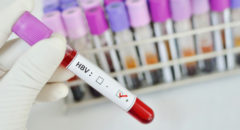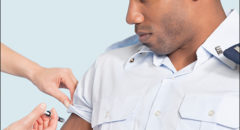
The Advisory Committee on Immunization Practices recommended Wednesday that all U.S. adults younger than 60 years be vaccinated against hepatitis B (HBV), a disease that is more likely to affect and kill Blacks.
Until now, the shots were recommended only for certain groups of adults, including prisoners, health care workers, international travelers, people with diabetes and certain other conditions, and those who inject drugs or who have multiple sexual partners, the Associated Press reports.
Hepatitis B vaccinations became standard for U.S. children in 1991, so most adults younger than 30 years are already protected.
The government advisory committee's unanimous decision -- which still requires the approval of the U.S. Centers for Disease Control and Prevention -- comes as progress against the liver-damaging disease stalls.
It is not clear when CDC Director Rochelle Walensky, M.D., will make a decision on the committee's recommendation.
If she gives the OK, tens of millions of adults between the ages of 30 and 59 years would be advised to get the shots against the liver-damaging disease, according to the AP.
RELATED: 4 Juices To Detox Your Liver
How are the shots administered?
The shots are given in either two or three doses, spaced a month or more apart. CDC data suggests that only about one-third of people with diabetes and chronic liver conditions have been vaccinated, in addition to just two-thirds of eligible health care workers, the AP reported. Overall, about 30 percent of all adults are vaccinated.
Roughly 1.9 million Americans are living with hepatitis B infections, though many may not
experience liver damage for many years.
The U.S. government has set a goal of eliminating viral hepatitis by 2030.
Symptoms of Hepatitis B
Signs and symptoms of hepatitis B range from mild to severe. Some people, especially young children, may not have any symptoms.
If you experience symptoms, they will usually appear about one to four months after you've been infected. However, in some cases, you could see them as early as two weeks post-infection.
These are the most common signs of Hepatitis B:
- Abdominal pain
- Dark urine
- Fever
- Joint pain
- Loss of appetite
- Nausea and vomiting
- Weakness and fatigue
- Yellowing of your skin and the whites of your eyes (jaundice)
Hepatitis B: Some Natural Remedies
Risk factors
Because this virus spreads through contact with blood, semen or other body fluids from an infected person; the following are the biggest risk factors of developing Hepatitis B:
- Having unprotected sex with multiple sex partners or with someone who's infected with HBV
- Share needles during IV drug use
- Are a man who has sex with other men
- Live with someone who has a chronic HBV infection
- Are an infant born to an infected mother
- Have a job that exposes you to human blood
- Travel to regions with high infection rates of HBV, such as Asia, the Pacific Islands, Africa and Eastern Europe
When to see a doctor
If you feel you have been exposed to Hepatitis B, you should contact your doctor immediately. Getting a preventative treatment can reduce your risk of infection if you receive the treatment within 24 hours of exposure to the virus. You should also contact your doctor if you are experiencing any of the signs or symptoms related to Hepatitis B.







